Finding a Home in the Mountains of Cuenca, Ecuador
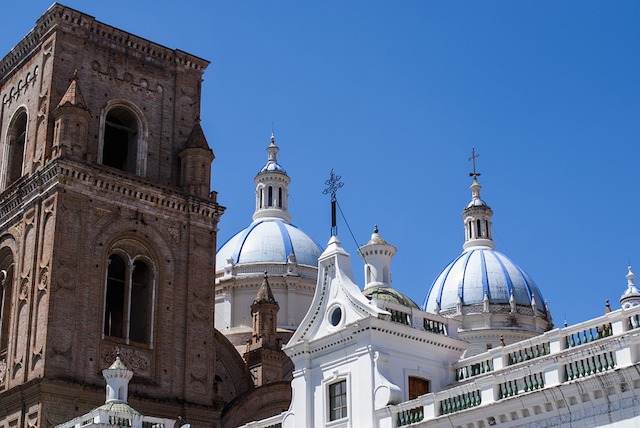
Two days after Christmas, we landed at night in Guayaquil, Ecuador. The coastal air was hot and muggy, crowds jammed the airport exits, and the knot in my stomach experienced a sudden growth spurt. This country, with whatever challenges it might bring, would be our new home for the next four years.
The harrowing trek to our assigned city of Cuenca began bright and early the next morning. From the warm, noisy, bustling city, my husband and I, along with Linda, the veteran missionary to whom we were assigned, drove from sea level to an elevation of 14,700 feet and then back down to 8,300 feet in only four hours. The drive began on a straight road lined with banana trees and sugar cane. Very soon, we were traveling steep, difficult curves through dense fog.
We quickly appreciated Linda’s 25 years of experience driving under adverse conditions, hugging the mountains with no guardrails for protection if a downward slide was accidentally set in motion.
Roses of every color, hibiscus plants with giant blooms, poinsettias as big as trees, hedges of vibrant lantana, and calla lilies seemed to grow wild – all of which would cost big bucks in the States.
Once we got out of the fog, the mountain views were breathtaking, despite the ice droplets on our windshield! Bathrooms enroute were scarce, almost non-existent. We finally found one that had no rim, no toilet paper and tree limbs growing through the windows, but by that point, we were extremely glad to have anything suitable. It was funny how quickly everything became “relative,” and the true essentials emerged.
As a reward for surviving, we stopped for lunch near El Cajas National Park at Dos Chorreras Hosteria, named for two crystal-clear waterfalls seen from the windows. What a comforting place. By then, the air was cool, crisp and thin, so the fireplace, coupled with the clean restroom and the delicious food, restored our resolve to embrace and adapt. A lunch of potato soup with avocado slices and farm-raised trout with potatoes was perfect in that setting and gave us our first taste of real Ecuadorian cuisine.
Forty-five minutes later, we arrived in Cuenca, and the sights, sounds, and smells bombarded us. Very old buildings, some revealing the city’s 450-year history, sat beside glass and mortar structures of the present. Indigenous Quichua people rubbed shoulders with Mestizo and white Ecuadorians.
Some women walked with baskets of produce on their heads to the open-air markets, while others drove nice cars to the local Supermaxi grocery chain. And, oh, the flowers. Roses of every color, hibiscus plants with giant blooms, poinsettias as big as trees, hedges of vibrant lantana, and calla lilies seemed to grow wild – all of which would cost big bucks in the States.
I couldn’t get mad. He was right. I had a lot to learn.
We found the furnished apartment chosen for our first months, unpacked, and started settling in. Slowly but deliberately, we acquired the tricks of living, cooking, and thriving at a high altitude. During one dinner in the early days where I had undercooked the chicken, and the rice and peas were still crunchy, my husband remarked that my cooking “reminded him of our newlywed days.” I couldn’t get mad. He was right. I had a lot to learn.
In the first few weeks, my nose, eyes and queasy stomach had to adjust to some unusual-for-me, but normal-for-them sights and smells. Whole roasted pigs with parts missing were displayed on the sidewalks, for instance. A pig started the day as one big hunk of barbecue, but as the day wore on and patrons came to buy particular chunks, the carcass grew leaner and more grotesque.
Even at the Supermaxi, the meat aisle was challenging, with its bags of chicken heads and feet and its packages of whole baby pigs, skinned guinea pigs, and huge black cow tongues. Within 6 months, I was “conditioned,” and my trips to the market got much easier.
Fortunately, I had high school and college Spanish under my belt, so I could at least read the signs and say basic phrases. My husband came to Ecuador knowing two words of Spanish — “taco” and “gracias.” And, sadly, tacos are rarely found in Ecuador. He was a diligent and highly-motivated student in language school. Eighteen months later, he taught an entire lesson in Spanish without a translator. By all indications, the class understood what he said.
Slowly but deliberately, we acquired the tricks of living, cooking, and thriving at a high altitude.
As a former elementary music teacher, I was delighted to realize I could teach “The Hokey Pokey” to Quichua children as well as to students in Alabama. Once I got a handle on managing the daily tasks of keeping house in Cuenca, I was happy to move on to teaching English, planning for volunteer groups from the States, and extending hospitality to Ecuadorians and fellow missionaries.
By making friends and staying teachable, we learned how to cook, communicate, drive, conduct business, entertain, and truly enjoy our adopted country. Those gracious people accepted us and loved us. We left behind treasured friends when we moved home after four years. Our lives were enriched immeasurably, and we remain grateful to have had such a life-changing opportunity.
Finding a Home in the Mountains of Cuenca, Ecuador
Have you traveled to Cuenca, Ecuador? How was your trip? Email us at [email protected] for information about sharing your experience and advice with the Pink Pangea community. We can’t wait to hear from you.
Photo credits for Finding a Home in the Mountains of Cuenca, Ecuador by Pixabay.

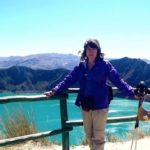
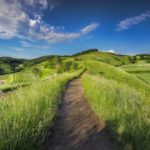
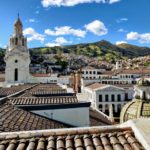


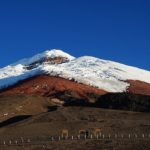
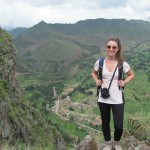
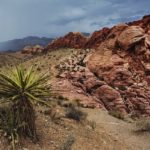
Terrific article, Connie. Your willing attitude and embrace of your location were definitely the keys to your success in Ecuador. Enjoyed reading about your day-to-day experiences! Buon Viaggio on your continuing adventures! -Anne
Thank you, Anne, for this sweet encouragement.
Hello Connie,
I don’t often reply,but when I read your piece, it was helpful to me.
Also I worked in Alabama for several years for a company from Dothan.
I have been in Ecuador (Manta) for a little more than a month.
And planning to move to Cuenca in a week or so.I am retired and looking
forward to Cuenca.
Also looking for a hotel for a few days and try to rent a simple furnished apartment.. (not fancy but clean).
If you are your husband know of anything,I would be grateful.
Thank you Jim Schuck
As far as a hotel goes, you might try Hotel Alejandrina, Hotel Santa Lucia or Mansion Alcazar because of their locations near the center of the city. Hotel Zahir 360 and Hotel Valgus are both new with helpful websites. They are near the soccer stadium, a very short taxi ride to downtown. These are the ones most recommended by my expat friend who has lived in Cuenca for a very long time.
Beautiful piece Connie. I loved reading about your adventures!
–MaryGo
Thank you, Mary.